Daily Vocabulary Words: List of Daily Used Words in Leading International Newspapers
Hi there. Welcome to this special section @ Wordpandit.
Our endeavour here is very simple: to highlight important daily vocabulary words, which you would come across in leading newspapers in the country. We have included the following newspapers in our selection:
• The New York Times
• The Washington Post
• Scientific American
• BBC
• The Guardian
• Psychology Today
• Wall Street Journal
• The Economist
We are putting in extensive work for developing your vocabulary. All you have got to do is be regular with this section and check out this post on a daily basis. This is your repository of words that are commonly used and essentially, we are posting a list of daily used words. Hence, this has significant practical application as it teaches you words that are used commonly in leading publications mentioned above.
Visit the website daily to learn words from leading international newspapers.
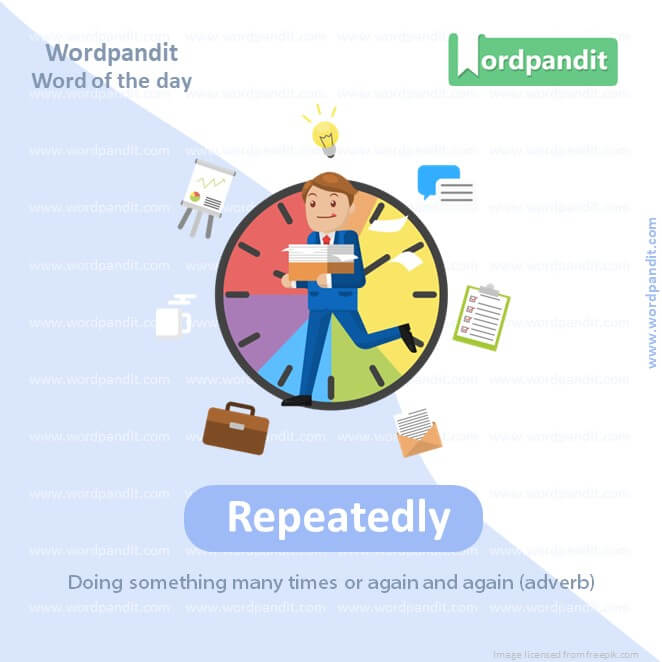
WORD-1: Repeatedly
CONTEXT: Israel repeatedly bombing the Rafah crossing between Egypt and Gaza.
SOURCE: Al Jazeera
EXPLANATORY PARAGRAPH: Imagine you have a favorite toy and you play with it every single day. If someone asks how often you play with it, you might say, “I play with it over and over.” That means you’re doing it repeatedly. It’s like doing something many times, one after the other.
MEANING: Doing something many times or again and again (adverb).
PRONUNCIATION: ree-PEET-id-lee
SYNONYMS: constantly, frequently, regularly, often, over and over, again and again, time and again
USAGE EXAMPLES:
1. She tapped on the window repeatedly.
2. The teacher repeatedly asked him to sit down.
3. Birds sing repeatedly every morning.
4. He repeatedly practiced his piano lessons until he got them right.
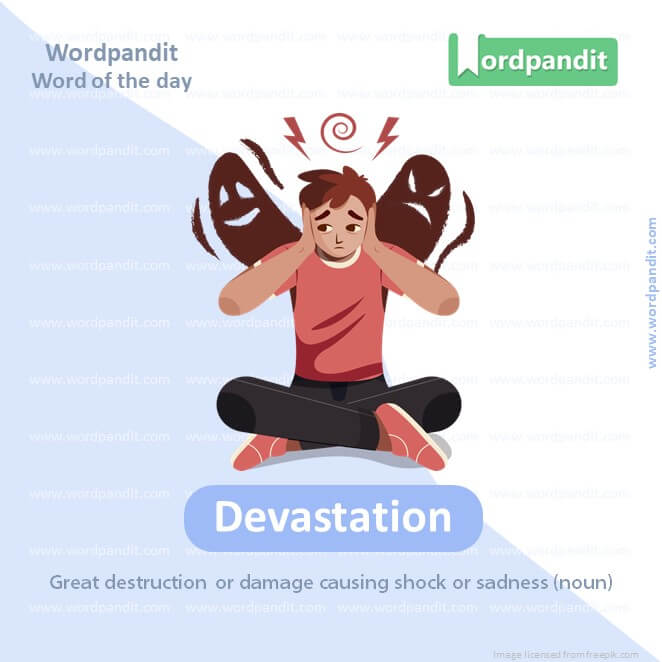
WORD-2: Devastation
CONTEXT: Iran warned of a possible “preemptive” action against Israel in response to the devastation caused by the attack on the hospital.
SOURCE: Washington Post
EXPLANATORY PARAGRAPH: Imagine a beautiful castle made of blocks. Now imagine someone knocking it all down, and the castle is all broken and messy. That big mess and the sad feeling you get when something beautiful is ruined is called devastation.
MEANING: Great destruction or damage causing shock or sadness (noun).
PRONUNCIATION: dev-uh-STAY-shun
SYNONYMS: destruction, ruin, damage, desolation, wreckage, havoc, decimation
USAGE EXAMPLES:
1. The hurricane left devastation in its path.
2. The news of the accident brought devastation to the family.
3. After the fire, there was complete devastation in the forest.
4. The town faced devastation after the floodwaters receded.
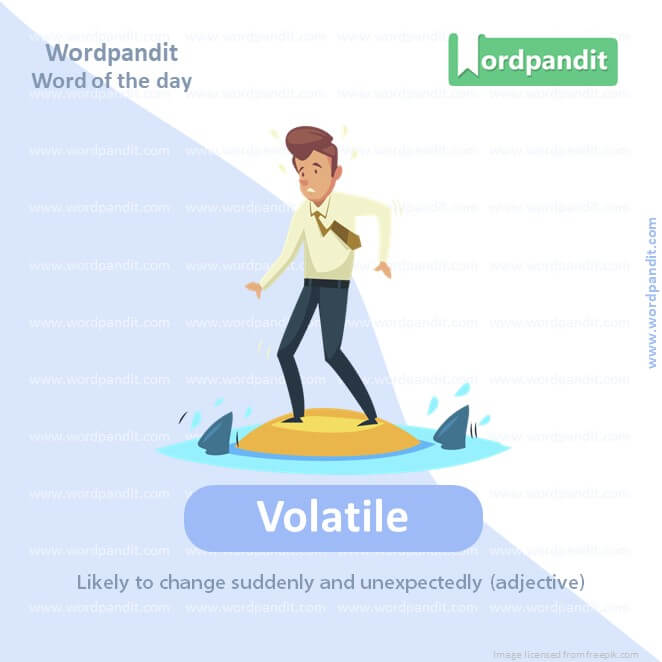
WORD-3: Volatile
CONTEXT: Swiftly dispatched powerful aircraft carriers and navy ships to the already volatile Eastern Mediterranean.
SOURCE: Al Jazeera
EXPLANATORY PARAGRAPH: Think of a balloon that suddenly pops when you least expect it. “Volatile” is like that – something that can change quickly and unexpectedly. It could be a situation or a person’s mood that changes fast.
MEANING: Likely to change suddenly and unexpectedly (adjective).
PRONUNCIATION: VOL-uh-tyle
SYNONYMS: unstable, unpredictable, changeable, explosive, erratic, fickle, flighty
USAGE EXAMPLES:
1. The weather today is volatile with sudden rain showers.
2. The stock market is volatile, with prices going up and down.
3. He has a volatile temper and gets angry quickly.
4. The situation became volatile after the disagreement.
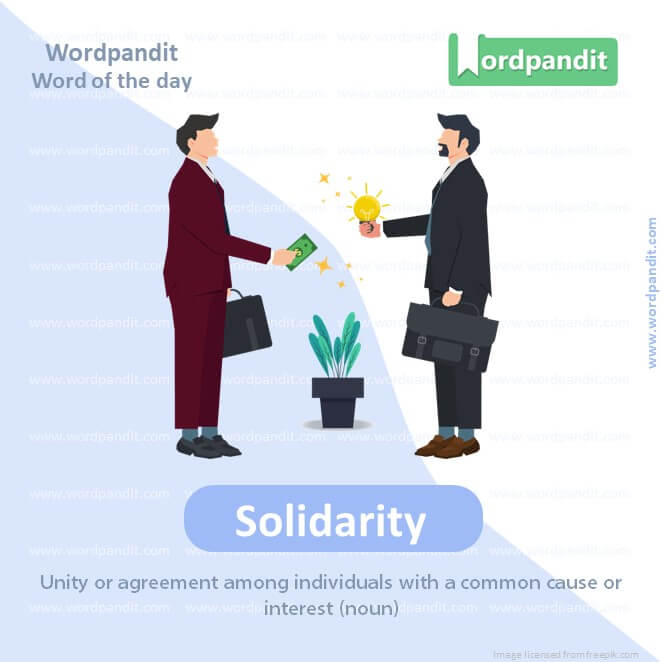
WORD-4: Solidarity
CONTEXT: Istanbul to Beirut took to the streets to express their solidarity with Palestinians and to call for an end to the attacks on Gaza.
SOURCE: Washington Post
EXPLANATORY PARAGRAPH: Imagine you and your friends holding hands, standing together because you all believe in the same thing or want to support each other. That’s solidarity. It’s like being a team and having each other’s backs.
MEANING: Unity or agreement among individuals with a common cause or interest (noun).
PRONUNCIATION: sol-i-DAR-i-tee
SYNONYMS: unity, togetherness, harmony, camaraderie, cohesion, alliance, bond
USAGE EXAMPLES:
1. The workers showed solidarity by striking together.
2. People wore ribbons as a sign of solidarity with the victims.
3. There was a sense of solidarity in the community after the disaster.
4. They marched in solidarity to protest the new law.
WORD-5: Unprecedented
CONTEXT: the death tolls and the devastation experienced by the long-suffering peoples of the region would be unprecedented.
SOURCE: New York Times
EXPLANATORY PARAGRAPH: Imagine you see a flying elephant for the first time ever! No one has ever seen it before. That’s something “unprecedented.” It means something that has never happened or been seen before.
MEANING: Never done or known before (adjective).
PRONUNCIATION: un-PREH-suh-den-tid
SYNONYMS: unique, unparalleled, unheard of, novel, new, first-time, groundbreaking
USAGE EXAMPLES:
1. The athlete’s achievement was unprecedented in sports history.
2. The city experienced an unprecedented growth in tourism this year.
3. The technological advancement was unprecedented and surprised everyone.
4. The pandemic brought about unprecedented challenges.
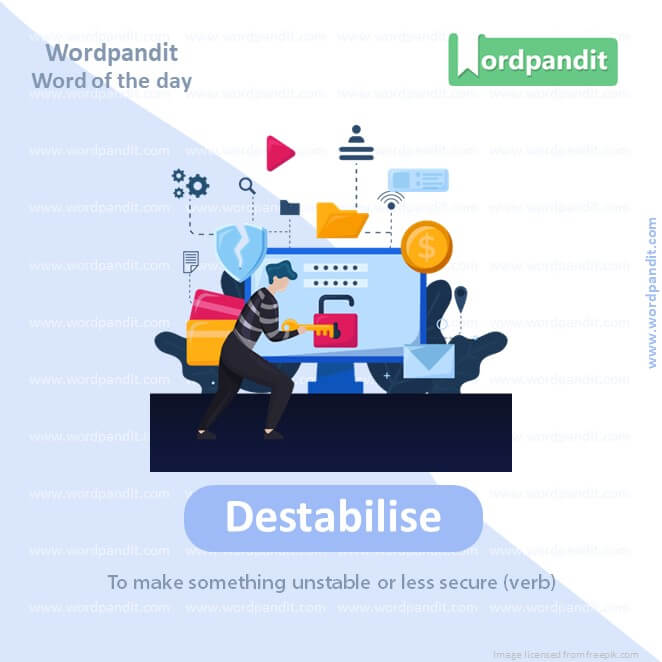
WORD-6: Destabilise
CONTEXT: it would undoubtedly destabilise Iraq and reverse some, if not all of the progress it made in recent years.
SOURCE: Al Jazeera
EXPLANATORY PARAGRAPH: Imagine a tower of blocks, and someone takes one block out from the bottom, causing the whole tower to shake and maybe fall. That action of making the tower shaky is like “destabilise.” It means making something less steady or secure.
MEANING: To make something unstable or less secure (verb).
PRONUNCIATION: dee-STAY-buh-lize
SYNONYMS: undermine, unsettle, disrupt, weaken, shake, subvert, unbalance
USAGE EXAMPLES:
1. The sudden news seemed to destabilise the government.
2. Economic crises can destabilise a country.
3. Misinformation can destabilise public trust.
4. The earthquake helped to destabilise the building.
WORD-7: Besieged
CONTEXT: Should the Gaza crisis fully spill outside the besieged enclave’s borders
SOURCE: Al Jazeera
EXPLANATORY PARAGRAPH: Imagine you’re in a fort, and there are many people outside trying to get in but you don’t let them. You feel surrounded and trapped. That feeling of being surrounded and under pressure is called “besieged.”
MEANING: Surrounded and attacked, or overwhelmed with requests (verb/adjective).
PRONUNCIATION: bih-SEEJD
SYNONYMS: surrounded, encircled, beleaguered, blockaded, overwhelmed, inundated, swamped
USAGE EXAMPLES:
1. The castle was besieged by enemy forces.
2. The mayor was besieged with complaints about the new policy.
3. Reporters besieged the celebrity as she left the building.
4. The small town was besieged by tourists during the summer.
WORD-8: Immeasurable
CONTEXT: If another conflict reaches the country’s borders, the suffering of the Syrian people will be immeasurable.
SOURCE: Al Jazeera
EXPLANATORY PARAGRAPH: Have you ever tried to count all the stars in the sky? It’s so hard because there are so, so many! When something is so big or so much that you can’t measure it or count it, it’s “immeasurable.”
MEANING: Too large, extensive, or extreme to measure (adjective).
PRONUNCIATION: im-MEZH-ur-uh-bul
SYNONYMS: boundless, limitless, infinite, vast, immense, endless, incalculable
USAGE EXAMPLES:
1. The universe is of immeasurable size.
2. Her kindness to the community is immeasurable.
3. The loss caused immeasurable pain to the family.
4. The benefits of the new project are immeasurable.
WORD-9: Embarked
CONTEXT: Israel has embarked on its own illegal war in response to its own 9/11.
SOURCE: Washington Post
EXPLANATORY PARAGRAPH: Imagine you’re about to step onto a big ship to go on a long journey. That action of starting your journey or adventure is called “embarking.” It’s like beginning something new or exciting.
MEANING: To begin a journey, especially on a ship or plane, or to start a new project (verb).
PRONUNCIATION: em-BARKT
SYNONYMS: commence, launch, undertake, start, set out, initiate, inaugurate
USAGE EXAMPLES:
1. They embarked on their honeymoon cruise.
2. She embarked on a new business venture.
3. After finishing school, he embarked on a career in medicine.
4. The explorers embarked on a journey through the desert.
WORD-10: Bombardment
CONTEXT: As the siege and bombardment of Gaza continues at full force, killing hundreds each day, maiming many more
SOURCE: Washington Post
EXPLANATORY PARAGRAPH: Think of a time when you and your friends had a snowball fight and everyone was throwing snowballs at each other non-stop. That action of constantly throwing things, especially in a battle, is like “bombardment.” It’s a lot of things coming at you all at once.
MEANING: A continuous attack with bombs, missiles, or other projectiles (noun).
PRONUNCIATION: bom-BARD-ment
SYNONYMS: shelling, barrage, onslaught, attack, assault, blitz, salvo
USAGE EXAMPLES:
1. The city endured a heavy bombardment during the war.
2. The media’s bombardment of information can be overwhelming.
3. The castle walls showed signs of past bombardments.
4. The team faced a bombardment of questions after the game.
vocabulary NDA
Understanding the Vocabulary NDA (Non-disclosure Agreement) is a crucial step in the world of business and law. These terms are not just a compilation of complex words, but a key to decoding legal implications that could affect your business.
Essentially, the Vocabulary NDA refers to the specific set of terms and phrases typically present in a non-disclosure agreement. Broadening your knowledge on this could significantly enhance your comprehension, allowing you to navigate the legal landscape more smoothly.
Mastering the vocabulary NDA starts by contextualizing. While it may sound highly technical, relating each term to real-world scenarios greatly facilitates one’s learning process. Realize that the words in the vocabulary NDA are not arbitrary; they align with certain legal concepts, circumstances, and proceedings.
Secondly, repetition plays an integral role. Regular exposure to the vocabulary NDA strengthens one’s memory, promoting the retention of information. Consider engaging in relevant discussions, reading articles, listening to podcasts, or even simply reviewing a non-disclosure agreement. This repetitive interaction ultimately ingrains the vocabulary NDA into one’s cognitive system.
The vocabulary NDA becomes less intimidating through practical application. It’s essential to apply these terms in actual situations – be it drafting your own NDA, or merely examining an existing one. This invites an in-depth understanding, making the vocabulary NDA more familiar and comprehensible.
Lastly, remember to continuously expand and refine the vocabulary NDA. Legal terminologies evolve, and so should your lexical prowess. Stay updated with new terms and modifications in law that could modify the existing vocabulary NDA.
To sum it up, learning the vocabulary NDA requires relatability, repetition, practical application, and continuous learning. Leverage these strategies, and break your barriers to legal fluency. Unfurl the complexities of the vocabulary NDA, for it’s a secret tool in your success arsenal.







